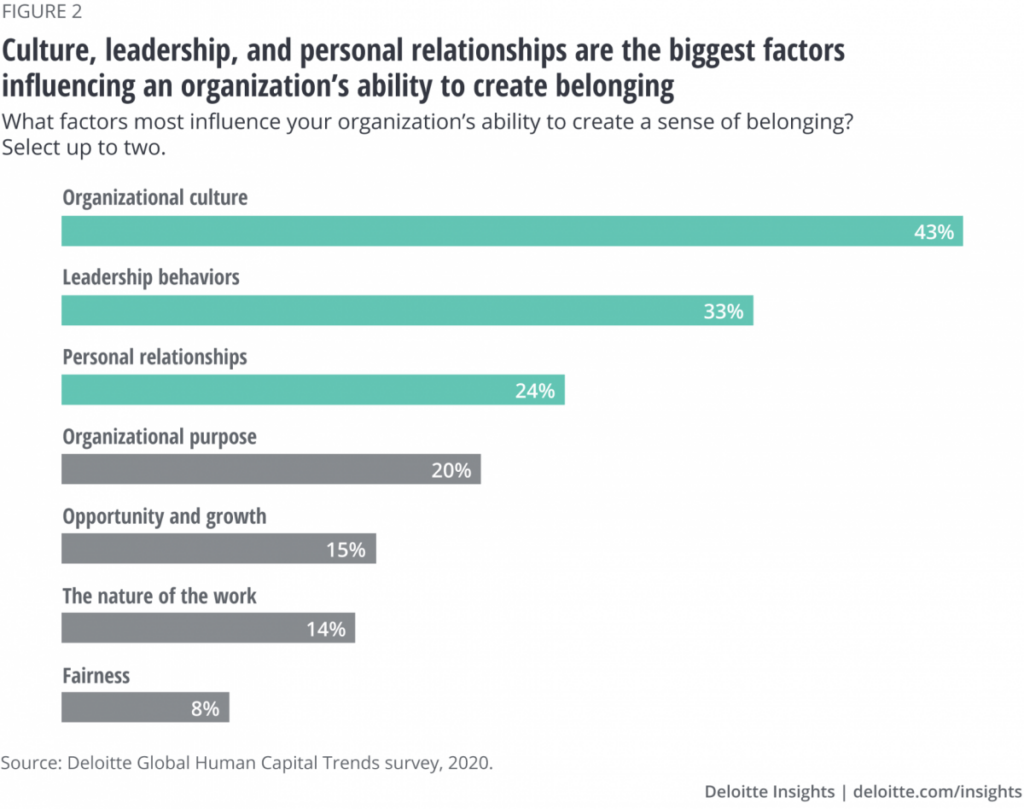The nature and health of human relationships and connections at work has always mattered, but even more so in a crisis, when existing fault lines are often widened, or already close groups, are brought even closer. Recent research found,
“7 in 10 said their company culture was good prior to the Covid-19 outbreak, and those people were more likely to say it had improved during the pandemic. At the other end, those who felt company culture was bad pre-Covid were more likely to say it has worsened.”
Prioritising healthy people and workplace cultures, is a fundamental moral, ethical, and legal responsibility of employers, regardless of circumstances.But we know it’s also the best crisis response organisations can make now.
It’s people who create organisations that can weather a storm, & culture is the environment which determines their ability to do so.
What we know from recent research

“Belonging, along with wellbeing, is at the top of this year’s Deloitte’s 2020 Global Human Capital Trends survey as the most important human capital issues.
79% of respondents said that fostering a sense of belonging in the workforce was important to their organization’s success in the next 12–18 months, and 93% agreed that a sense of belonging drives organizational performance – one of the highest rates of consensus on importance in a decade of reports.”
MIT Sloan “Companies showing the most agility and resilience in their response to the global pandemic are pursuing four main strategies.
1. Prioritize people. One of the biggest lessons from the pandemic is that people are the key to rapid innovation and resilience.
Solidarity has proven to be more contagious than the virus itself.”
PwC “COVID-19 .. companies should focus on three key actions. 1. Go deep on employee safety and well-being. No business strategy can be effective if it doesn’t embed employee health, safety, and well-being into its DNA. As your focus shifts from survival and resilience to recovery and the long-term health of your company, redesigning your employee experience (EX) will be paramount.
2. Deepen your connection with those who work for you. It’s important to double down on a strong and positive culture, one that demonstrates connection to and care for employees in every possible way.”
Gartner “What are the long-term implications of the coronavirus pandemic? … Fortify your culture of inclusiveness. Ensure that leaders develop emotional intelligence and other soft skills.”
MIT Sloan “Leading through radical uncertainty .. great leadership is always about an emotional connection. Ask yourself: How are people experiencing you? And how are they experiencing themselves when they’re with you? Would they report feelings of mutual trust?” 
BCG “It turns out that social connectivity is a critical element of what enables us to be productive when collaborating in the workplace.
So, for any company looking to adapt to new virtual or hybrid virtual/onsite workplaces, promoting virtual social connectivity between colleagues is going to be critical.”
Covid-19 is limiting and changing human connection in the working lives of millions globally, in ways that leave so many craving more. But there’s so much more required, by organisations and the people working for them, to evolve work in meaningful and psychologically healthy ways.
Part 2 of this article series will explore other considerations, for our current and post-Covid-19 world of work.
———————————-
Karen Walker is an Advisor, Expert and Operative in Strategy Execution, the series of decisions and actions undertaken to turn strategic visions of organisations into reality. An evolving journey of understanding possibilities and using situational awareness to adapt tactics and goals to realise maximum value.
A specialist in the casino and gaming industry, with extensive experience in the implementation of new and innovative practices and the establishment of greenfield operations, Karen’s career spans senior operational management and leadership, program director, project and change management, and business transformation lead roles, across a number of sectors.






